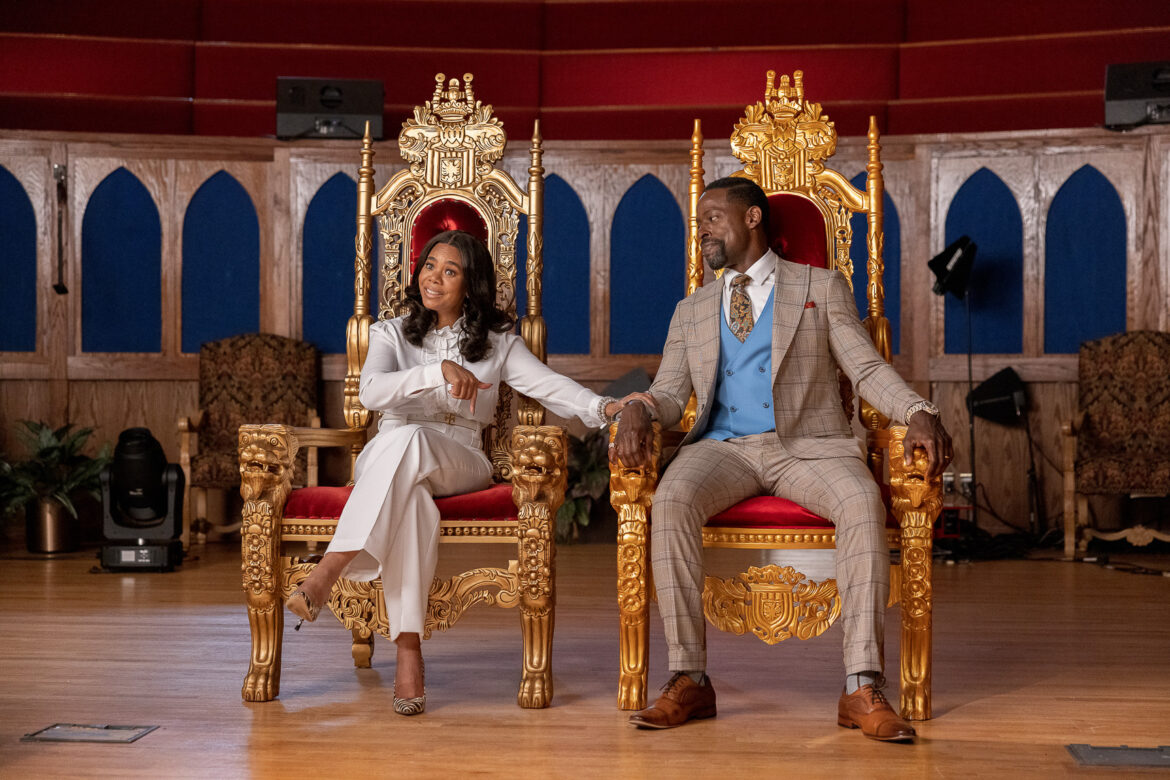By Kirsten Coachman
Creative sibling partnerships have thrived in the world of filmmaking (see: The Russo brothers, the Duplass brothers, the Cohen brothers), and when it comes to their partnership, twin sisters Adamma and Adanne Ebo wouldn’t have it any other way. The two solidified their professional partnership while Adamma was working on her second-year short film at UCLA.
“I was looking to get in on the creative side of things, and she asked me to produce one of her short films for school,” explained Adanne, who was in law school at the time.
“We had to produce our own super small [films] our first year, and I did not enjoy it,” said Adamma, with a laugh. “At the same time, I knew Adanne was feeling like firm life was not going to be for her, and she was wanting to come to the [creative] side of things. I was like, ‘She would be really good at this.’ And she was. She knocked it out of the park.”
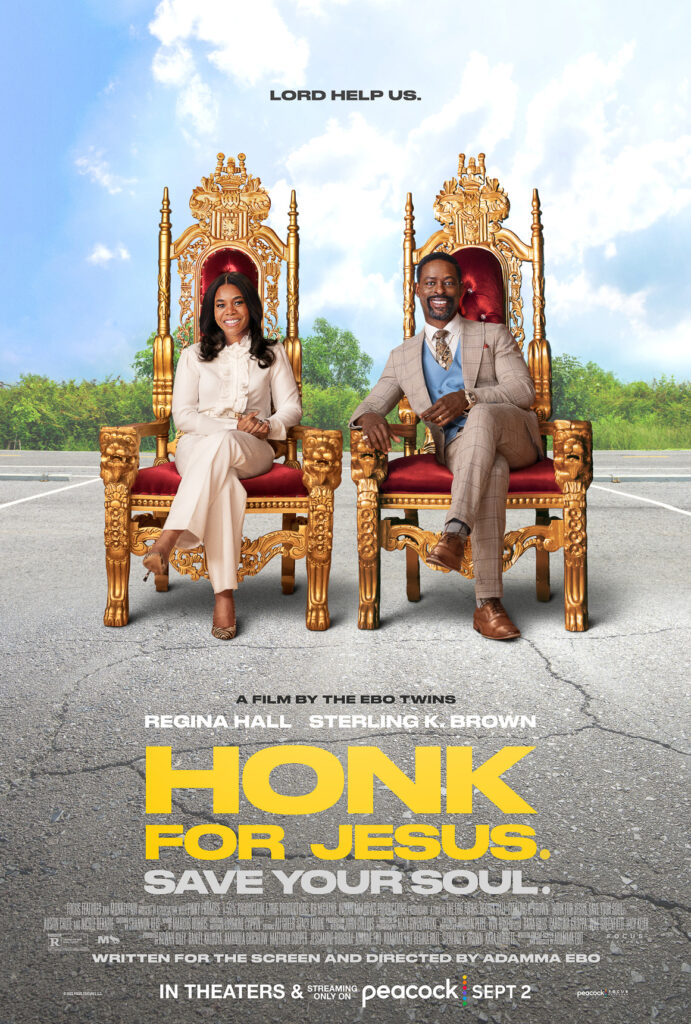
Their new film, “Honk For Jesus. Save Your Soul.”—written and directed by Adamma—is a satirical comedy that takes place in the aftermath of a major scandal at Wander to Greater Paths Baptist Church, a megachurch based in Atlanta. At the center of the scandal are Pastor Lee-Curtis Childs (Sterling K. Brown, “This Is Us”) and his wife and first lady Trinitie Childs (Regina Hall, “Girls Trip”), whose sizable congregation has since departed, resulting in the closure of their church. The Childs subject themselves to being followed by a documentary crew “to chronicle the ultimate comeback,” while, via roadside ministry, they look to refill the halls of their church and return to the pulpit by a fast-approaching Easter Sunday.
Art U News recently had the opportunity to sit down with Adamma and Adanne as well as stars Hall and Brown during a recent press stop in San Francisco to discuss the making of their film.
Casting the Childs
In the film, which debuted at the Sundance Film Festival earlier this year, audiences meet a hyped-up and confident Lee-Curtis ready to make his return to saving souls sitting across a somewhat reluctant Trinitie. It’s an early glimpse into the relationship between the gregarious preacher and the first lady, who is hesitant about the documentary project. Although more reserved, Trinitie can still flash a smile and combat a “bless your heart” without missing a beat.
Adamma and Adanne searched for a “Regina Hall type” to take on the role of Trinitie. They wanted an actor who could take on the complexities of Trinitie and what it means to be a first lady—all while bringing a comedic flair to the role.
“[Regina] was the archetype,” said Adamma. “We knew that she could do both. And everything in between.”
It was challenging to find the right acting counterpart to play Lee-Curtis. When Brown’s name was initially brought up for the role, the Ebo sisters were intrigued.
“We only knew him from making us cry,” shared Adanne. “But we did a little deep dive into what he’s done, and he was actually nominated for an Emmy for a guest-starring on an episode of ‘Brooklyn Nine-Nine.’ He plays a narcissistic murderous dentist … Like, it’s deadpan comedy, and he’s so phenomenal in it. He’s so hilarious. And he’s charismatic at it, he’s a very suave guy, but he’s definitely playing the room. He’s narcissistic, he’s manipulative, and we were like, ‘Well, that’s Lee-Curtis.’”
“I think also tantamount is that he was funny,” added Adamma. “I was like, ‘Okay, he can handle the tone,’ because this movie [is a] total rollercoaster.”
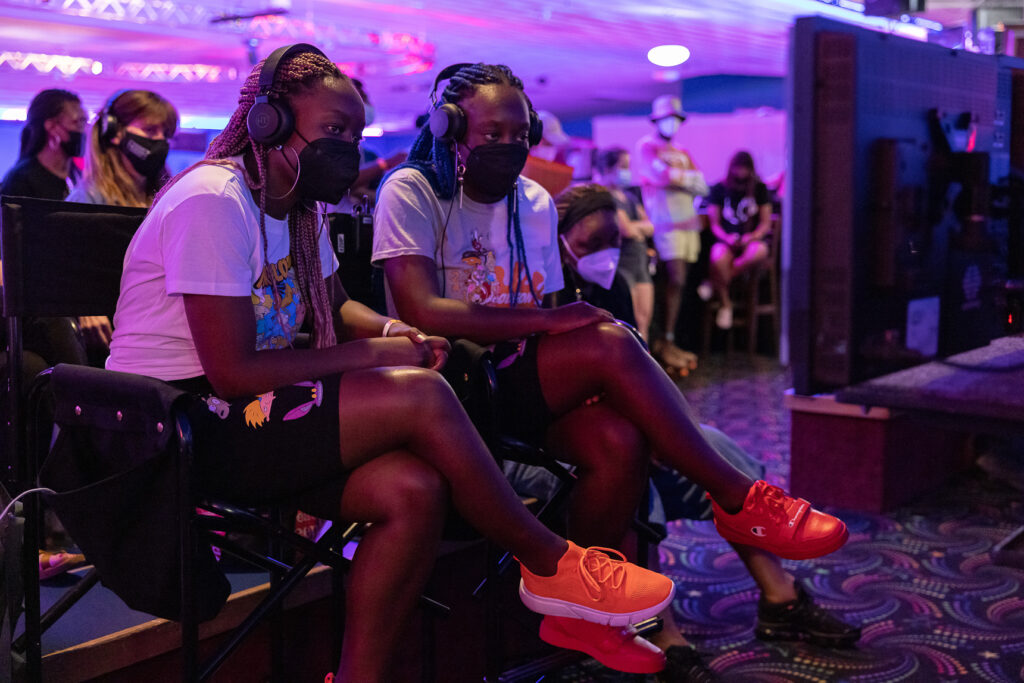
The film contains plenty of laughs courtesy of the larger-than-life Lee-Curtis, especially when it comes to playing up the over-the-top blessings that he and Trinitie have accumulated on camera, from their home and numerous cars to the designer clothing, expensive shoes, and fancy hats.
However, in a private moment of shared frustration between Trinitie and Lee-Curtis, the audience is shown the deep-seated issues affecting their relationship. It’s a scene Brown pointed to as one that stuck out to him in the script.
“I remember talking to Regina about this the first time that we talked about the film over Zoom. We were talking about the love scene. I call it ‘the bedroom scene’ because love seems like an over-step,” said Brown. “But just how painful, how funny slash awkward, and just profoundly sad. These two people found themselves trying to make a connection and just not being able to do it the way that each of them would want to be able to.”
“What was great about that is by the time they shot that scene, it was towards the end of the movie where Trinitie and Lee-Curtis—I felt like Sterling and I were completely comfortable with each other,” Hall added. “We knew how uncomfortable the love scene was, but it was still two people who cared so much for each other.”
On-set dynamic
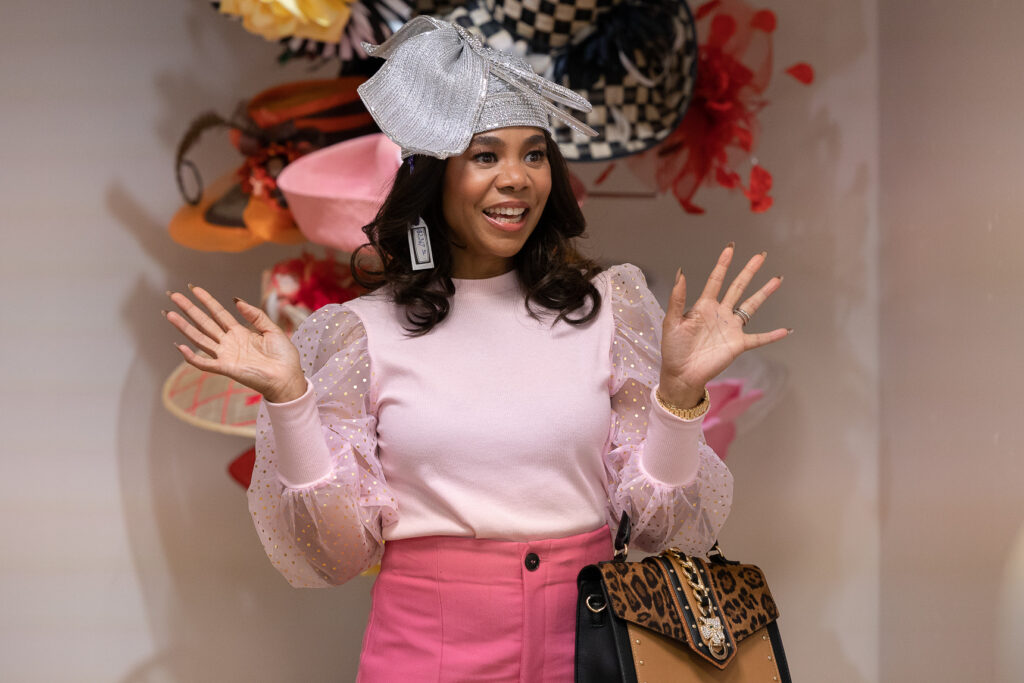
Although they were a part of a feature debut film, Brown and Hall shared that they didn’t feel any added pressure while working on the project. Rather, knowing how hard their director and producer worked to get the film to that stage, the actors wanted to be as helpful as possible throughout the filmmaking process.
“I think we both had an idea of like, ‘Alright, how can we help make their movie the best experience possible for them?’” said Brown.
“You know how hard they work—they went through a short to writing this as a feature, to doing it, to raising the money, and I think for Sterling and I, we just wanted to give them our best,” said Hall, elaborating, “There’s a dreaming that must happen, right? For a character to come to life, but first, for a character to be put on paper in a world. So, for us, it was like Sterling said, ‘How do we facilitate that? How do we help create that? How do we co-create with them this dream—this vision—of these characters and this church?’”
So what does that collaborative dynamic look like on set?
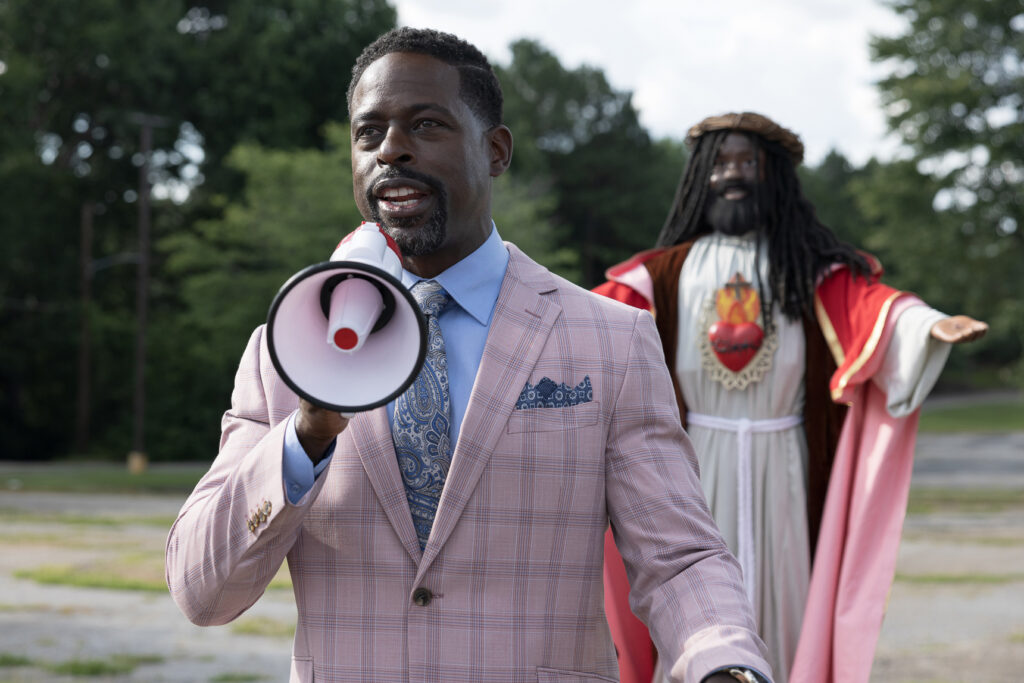
“Oh, we’re not to be looked at in the eyes,” Hall quickly deadpanned. “No eye contact.”
Jokes aside, Brown spoke of a caring and attentive set environment, but more than anything, he shared that he wanted to ensure that Adamma and Adanne were getting everything they needed.
“They tried to do so much for us. Like, if you say you thirsty or hungry, somebody’s going to take off running,” said Brown. “Like y’all can go back to video village, somebody will grab us something to drink. You know what I mean? They just wanted to [check in]—’How are you feeling, Sterling? Are you happy?’ I’m like, ‘Are you happy? This is your movie. You the one looking through this monitor, I wanna know if you’re happy.’ I think they have a natural inclination towards creating a familial environment.
“I felt like if that was their first time—which it was—then they’ve been here before because they handled themselves like absolute professionals from beginning to end.”
Writing and playing complex characters
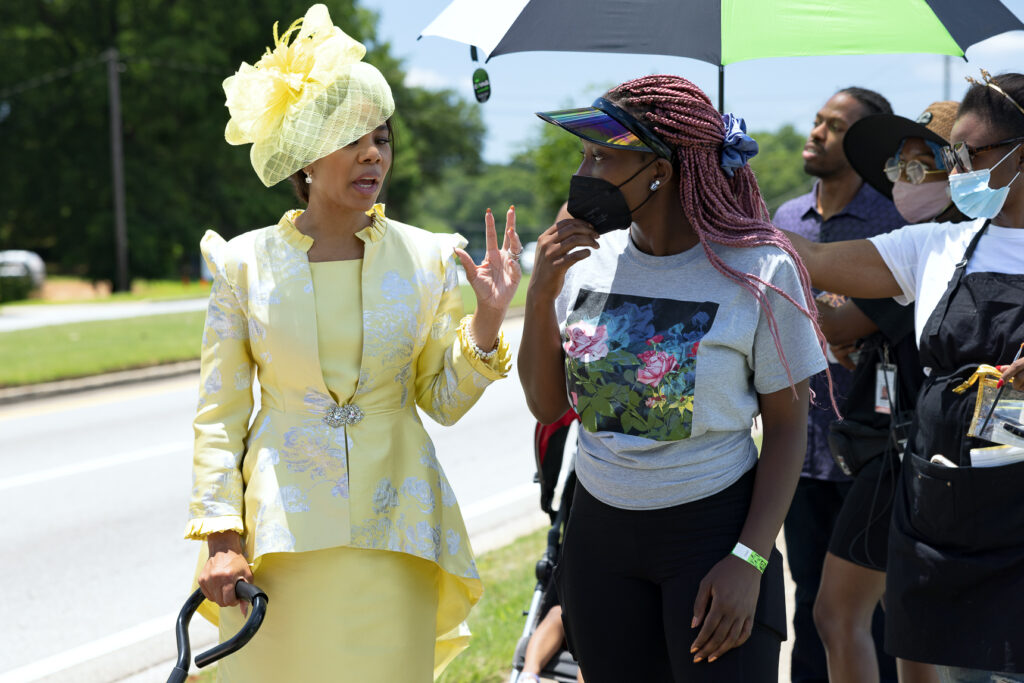
Throughout the film, Trinitie and Lee-Curtis put up a united front while on camera, yet individually, the audience sees the conflicted and complex individuals behind the facade. When describing her approach to writing her characters, Adamma shared that she wanted Trinitie and Lee-Curtis to “feel like a team that has fallen out of whack.”
“I think within that you see glimpses of how they became a good team and why this works for them,” Adamma explained. “It was mostly building a lot of scenes where you see the cracks in the foundation and sprinkling in the moments where it’s like, ‘Oh, that’s why they’re so desperate for this to come back. It’s because this worked really well for them at one point.’”
When it came to expressing the complexity of how their characters operated as a unit onscreen, Hall related it to the everyday roles people in real life find themselves in.
“Everyone plays their role in a marriage, or a workspace, or life,” said Hall. “It was instinctive, also.”
“I think there’s natural tension there,” Brown said of their characters. “That happens in terms of our unit. But we recognize and respect that we need each other, like I need her realism every once in a while, and be like, ‘Look bruh, this is what’s happening. You need to be aware of this stuff.’ And I’m like, ‘Yeah, but we are going to get this all back, too.’ I think when things are good, they complement each other exceptionally well. When things are bad, there’s tension.”
Takeaways and words of wisdom
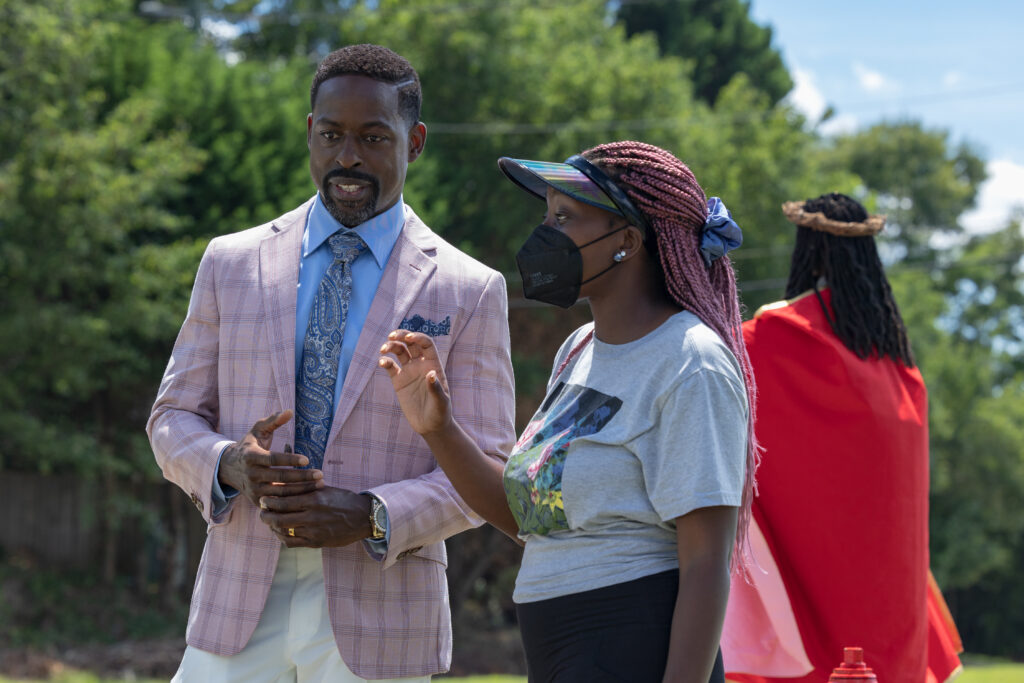
While “Honk For Jesus. Save Your Soul.” looks at the commodification of religion and aspects of megachurch culture—for better or worse—Adamma hopes audiences unfamiliar with the culture recognize that there are layers to what they’re seeing in this limited capacity on screen.
“There’s stuff that is very performative and probably on its face, very strange, but there is so much energy and joy as well,” the director said. “So, I hope people actually leave this wanting to learn more, if not about the culture itself, just more about how this functions. Because it’s a big culture, and it is so meaningful to so many people.”
With the fall semester just around the corner at the time of reporting, Adamma, Adanne, Brown, and Hall took a moment to impart a few words of wisdom and encouragement for Academy of Art University filmmaking and acting students.
“Even if you are new in your journey, new in your career, or young in your career, continue to make the movie you want to make. Continue to tell the story you want to make,” advised Adamma. “As you add more and more people and auspices, there’s going to be more and more voices and people with a lot more experience than you. Nobody knows your story. Nobody knows your vision better than you, and root yourself in that. Be collaborative; this is a collaborative medium, and we need everyone for these things to get made, but if your gut is telling you something about your story, follow it.”
“I would say, just jump in,” said Adanne. “Like, I knew nothing about anything when I produced our first short together, and it was baptism by fire, but that’s kind of how you learn—you just learn by doing, so just jump in. Don’t worry about if you have the right credentials or if you have the right education; just shoot your shot.”
“There’s a lot of no’s that you hear in this industry,” said Brown. “You have to have some deep abiding belief in yourself that says yes. In the face of those no’s and the more that you hear the no’s, the deeper you have to believe in that yes.”
“Preparation is always good. If you really want a long career, don’t think about the flashiness of being an actor,” said Hall. “The real work: taking the time and listening to [your instructors] and having fun doing the work, even when it’s hard. I think the outside looks a lot more glamorous, and it’s long days and a lot of hard work that goes into doing it. Be committed to the work; that’s what will get you through the no’s and to the yeses.”
“Honk For Jesus. Save Your Soul.” is now playing in theaters and is available to stream on Peacock.
